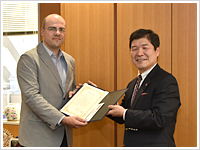- トップページ
- 活動
- 学生による授業アンケート
- Good Practice
- APPROACHES TO INTERCULTURAL COMPETENCE
活動学生による授業アンケート
Good Practice 2015年度秋学期
APPROACHES TO INTERCULTURAL COMPETENCE
CONSTANTINESCU Cezar(グローバル教育センター講師)
受賞のコメント
This course was offered for the first time at Sophia University in the fall of 2015 and I was lucky to have a group of students as the pioneer group who through their hard work and enthusiasm made this course a success. I am very happy to see that the students appreciated the focus on cooperative analysis of texts and curiosity-driven research despite the challenge of having to do all this in a foreign language.
The positive feedback which led to the Good Practice award is a great motivation and I am looking forward to many more courses like this.
学生のコメント
- 毎回の講義の中にディスカッションの時間もあり、異文化理解を深めるだけでなく、英語の運用能力を高めることができました。話す、聞く、書く、読むという全てのスキルを毎週の授業で活用し、教員からの質問はトピックについて考えさせるものが多くて大変良かったです。
- A decent amount of case studies make this class very special. A lot of students have different backgrounds and they make this class more useful for me.
- 少人数の授業なのでディスカッションがたくさん出来たのが良かったです。先生の熱意も感じ、授業で取り扱う内容も興味深いものばかりでした。
- 学生の理解度に応じて授業が展開したため
講義概要
In this course we investigate the different approaches to intercultural competence, take a look at where we encounter the term in education and training in different countries and think about it from a teacher’s and a learner’s perspective. The big question we will try to answer is: "Can intercultural competence be taught at all?" If not, how can one acquire the necessary skills that the scientific, corporate and political world demand?
The course is directed towards foreign language learners, future language teachers and students with a focus/interest in education, sociology, applied linguistics and politics.
到達目標
At the end of the course students will
- 1)know that there are different approaches to intercultural competence.
- 2)know a number of descriptions of skill sets and goals associated with intercultural competence.
- 3)have taken a glimpse at politics and policies surrounding the concept.
- 4)be able to further investigate the ideas behind intercultural competence.
- 5)be able to think about the aspect of intercultural competence in their own learning and teaching.










